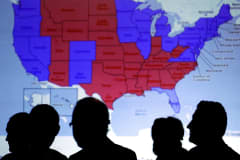
AP
Silhouettes of people's heads are seen in front of an 2012 electoral U.S. Map.
It's the most conventional wisdom in Washington, the unchallenged idea that America is a divided nation, a country ripped into red and blue factions in perpetual conflict. The government shutdown this fall would seem like only the latest evidence of this political civil war. But is the idea of two Americas even true? Not according to a new Esquire-NBC News survey.
At the center of national sentiment there's no longer a chasm but a common ground where a diverse and growing majority - 51% - is bound by a surprising set of shared ideas.
"Just because Washington is polarized doesn't mean America is," says Robert Blizzard, a partner at Public Opinion Strategies, the lead pollster for Mitt Romney in 2012. His firm co-created the survey with the Benenson Strategy Group, pollsters for President Obama, and the result is a nation in eight distinct segments: two on the far right ("The Righteous Right" and "The Talk Radio Heads"), two on the far left ("The Bleeding Hearts" and "The Gospel Left"), and four in the middle that represent nothing less than a new American center ("Minivan Moderates," "The MBA Middle," "The Pick-up Populists, and "The #WhateverMan.")
Political theater takes center stage on Capitol Hill
Lawrence Lindsey, The Lindsey Group CEO, shares his thoughts on the looming government shutdown and why he would have a different kind of "transparency" at the Fed.
The people of the center are patriotic and proud, with a strong majority (66 percent) saying that America is still the greatest country in the world, and most (54 percent) calling it a model that other countries should emulate. But the center is also very nervous about the future, overwhelmingly saying that America can no longer afford to spend money on foreign aid (81 percent) when we need to build up our own country.
Pluralities believe that the political system is broken (49 percent), and the economy is bad (50 percent) and likely to stay that way a while (41 percent). Majorities fear another 9/11 or Boston-style bombing is likely (70 percent), and that their children's lives will be more difficult than their own (62 percent), which are either stuck in place or getting worse (84 percent) — while the rich keep getting richer at the expense of everyone else (70 percent).

No comments:
Post a Comment